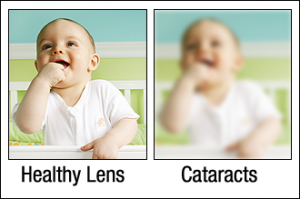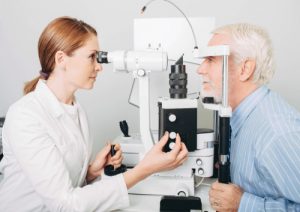Is your vision cloudy, foggy, or starting to decline? These are some signs that you may have cataracts.
Cataracts are one of the most common age-related eye conditions. Although anyone can develop them, they are most common in adults 40 and older.
Many age-related eye conditions aren’t curable, only manageable through early detection and treatment. However, with cataracts, you can have them removed by having cataract surgery.
One of the most pressing questions for cataract patients is when to have cataract surgery. Should you have the procedure right after receiving the diagnosis?
For many patients, having cataract surgery right away may not be necessary. Keep reading to learn more about cataracts and understand when it’s best to have cataract surgery.
Cataracts

Cataracts occur when the eye’s natural lens, which is normally clear, becomes cloudy. This happens when proteins on the lens start clumping together, affecting vision.
Cataracts almost always develop as a side effect of aging. Sometimes, diabetes or a traumatic eye injury may cause cataracts, but most of the time, they develop as you age and get older.
The kind of cataract that develops along with age develops very slowly. You may have cataracts for years before noticing any symptoms. It can be years or even decades before you realize you have cataracts.
It’s helpful to have regular eye exams to receive a diagnosis before you develop symptoms. Even though you may not need treatment immediately, your eye doctor can help monitor the progression of your cataracts and advise you on pinpointing the various symptoms as they occur. Knowing what to expect will make dealing with cataracts easier.
Cataract Symptoms
The primary symptoms of cataracts are:
- Blurry vision
- Poor night vision
- Light sensitivity
- Glare
- Halos
- Decreased ability to see contrast
- Seeing colors as muddied or faded
- Experiencing double vision in only one eye
- Frequently needing a new prescription for your glasses or contact lenses

Since cataracts develop slowly, you may not notice these symptoms at first. When they start to occur, you may mistake issues with your vision with prescription changes or presbyopia, which is also a common age-related condition.
But if you have cataracts, stronger prescriptions and reading glasses will no longer be able to correct your vision in full. The more advanced your cataracts are, the smaller the effect even the strongest reading glasses can have.
Cataract Surgery
The only way to treat cataracts is by having cataract surgery. Getting stronger prescriptions for your glasses or contact lenses or using more light are only temporary fixes.
Because of how common cataracts are, it isn’t surprising that cataract surgery is the country’s most commonly performed medical procedure. It’s a very low-risk outpatient procedure and doesn’t require any general anesthesia. You’ll only receive a local anesthetic in the form of eye drops that numb the eye.
Removing your cataract involves removing the natural lens from the eye. During cataract surgery, your cataract surgeon will create a small incision in your eye before breaking up the natural lens.
They remove the natural lens through the incision and then insert your new intraocular lens to take its place. The intraocular lens (IOL) is an artificial lens that allows you to see clearly once more.
Cataract surgery is the only way to restore any vision loss due to cataracts. It’s well worth having and may be medically necessary to prevent or reverse blindness. But you may not need it right away.
When to Have Cataract Surgery

Cataract surgeons recommend having cataract surgery when your cataracts begin to affect your quality of life. With cataracts, you may be unable to complete simple tasks like chores, cooking, or the things you once loved.
Some patients with cataracts never need cataract surgery. But if you start experiencing symptoms that make it harder to perform daily tasks, this may be a sign that you should have cataract surgery.
Sometimes it can be hard to determine when your cataracts affect your life. But there are a few signs that mean you’re likely ready for cataract surgery.
One is if you have trouble driving at night. Do you find that you have poor night vision due to intense glare from oncoming traffic headlights?
Are you struggling with light sensitivity that makes you feel blinded when you drive in the evening? These symptoms can make operating a vehicle after dark feel downright dangerous. If driving at night makes you feel unsafe, find a friend or family member to drive you until you can have cataract surgery.
Another sign you need cataract surgery is if you ever injure yourself due to visual impairment. Whether you trip and fall or bump into something, you should take it as a sign that your vision is suffering and you need relief by having your cataracts removed.
You should have cataract surgery before you injure yourself or feel unsafe driving at night. But if you experience these issues, it’s a sure sign you’re ready for cataract surgery.
Beyond that, be aware of your vision and how it affects your daily life. If your impaired vision makes you struggle, talk to your ophthalmologist about if it’s time for cataract surgery.

Your eye doctor can make recommendations based on your symptoms and how they affect you. They’ll recommend when to start thinking about cataract surgery, especially if your quality of life is suffering.
When you’re unable to see, it can make even the simplest tasks seem downright impossible. Take back your life by scheduling a cataract consultation at Sierra Nevada Eye Center in Reno, NV, now!
If you think that it may be time to have cataract surgery, there’s no time that’s better to start getting your clear vision back.


